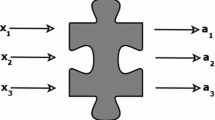Abstract
The point of departure for this article is Werner Heisenberg’s remark, made in 1929: “It is not surprising that our language [or conceptuality] should be incapable of describing processes occurring within atoms, for … it was invented to describe the experiences of daily life, and these consist only of processes involving exceedingly large numbers of atoms. … Fortunately, mathematics is not subject to this limitation, and it has been possible to invent a mathematical scheme—the quantum theory [quantum mechanics]—which seems entirely adequate for the treatment of atomic processes.” The cost of this discovery, at least in Heisenberg’s and related interpretations of quantum mechanics (such as that of Niels Bohr), is that, in contrast to classical mechanics, the mathematical scheme in question no longer offers a description, even an idealized one, of quantum objects and processes. This scheme only enables predictions, in general, probabilistic in character, of the outcomes of quantum experiments. As a result, a new type of the relationships between mathematics and physics is established, which, in the language of Eugene Wigner adopted in my title, indeed makes the effectiveness of mathematics unreasonable in quantum but, as I shall explain, not in classical physics. The article discusses these new relationships between mathematics and physics in quantum theory and their implications for theoretical physics—past, present, and future.
Similar content being viewed by others
References
Wigner, E.: The unreasonable effectiveness of mathematics in the natural sciences. Commun. Pure Appl. Math. 13, 1 (1960)
Heisenberg, W.: The Physical Principles of the Quantum Theory. Dover, New York (1930). Translated by Eckhart, K. and Hoyt, F.C., rpt. (1949)
Bohr, N.: The Philosophical Writings of Niels Bohr, 3 vols. Ox Bow Press, Woodbridge (1987)
Heisenberg, W.: Physics and Philosophy: The Revolution in Modern Science. Harper & Row, New York (1962)
Schrödinger, E.: The present situation in quantum mechanics (1935). In: Wheeler, J.A., Zurek, W.H. (eds.) Quantum Theory and Measurement, pp. 152–167. Princeton University Press, Princeton (1983)
Kahn, C. (ed.): The Art and Thought of Heraclitus: A New Arrangement and Translation of the Fragments with Literary and Philosophical Commentary. Cambridge University Press, Cambridge (1981)
Kragh, H.: Dirac: A Scientific Biography. Cambridge University Press, Cambridge (1990)
Greene, B.: The Elegant Universe: Superstrings, Hidden Dimensions, and the Quest for the Ultimate Theory. Random House, New York (2000)
Weyl, H.: Symmetry. Princeton University Press, Princeton (1983)
Weyl, H.: Theory of Groups and Quantum Mechanics. Dover, New York (1984)
Heisenberg, W.: Encounters with Einstein, and Other Essays on People, Places, and Particles. Princeton University Press, Princeton (1989)
Aristotle: The Complete Works of Aristotle, 2 vols. Princeton University Press, Princeton (1984). Edited by Barnes, J.
Wheeler, J.A.: Law without law. In: Wheeler, J.A., Zurek, W.H. (eds.) Quantum Theory and Measurement. Princeton University Press, Princeton (1983)
Arndt, M., Nairz, O., Voss-Andreae, J., Keller, C., van der Zouw, G., Zeilinger, A.: Wave-particle duality of C60. Nature 401, 680 (1999)
Plotnitsky, A.: Epistemology and Probability: Bohr, Heisenberg, Schrödinger, and the Nature of Quantum-Theoretical Thinking. Springer, New York (2009)
Pais, A.: Einstein and the quantum-theory. Rev. Mod. Phys. 51, 863 (1979)
Einstein, A.: Autobiographical Notes. Open Court, La Salle (1991). Translated by Schilpp, P.A.
Proust, M.: The Remembrance of Things Past, 3 vols. Vintage, New York (1981). Translated by Moncrieff, C.K.S. and Kilmartin, T.
Kant, I.: Critique of Pure Reason. Cambridge University Press, Cambridge (1997). Translated by Guyer, P. and Wood, A.W.
Gray, J.: Plato’s Ghost: The Modernist Transformation of Mathematics. Princeton University Press, Princeton (2008)
Weyl, H.: The Continuum: A Critical Examination of the Foundation of Analysis. Dover, New York (1918). Translated by Pollard, S. and Bole, T., rpt. (1994)
Einstein, A., Podolsky, B., Rosen, N.: Can quantum-mechanical description of physical reality be considered complete? (1935). In: Wheeler, J.A., Zurek, W.H. (eds.) Quantum Theory and Measurement, pp. 138–141. Princeton University Press, Princeton (1983)
Heisenberg, W.: Quantum-theoretical re-interpretation of kinematical and mechanical relations (1925). In: Van der Waerden, B.L. (ed.) Sources of Quantum Mechanics, pp. 261–277. Dover, New York (1968)
Heisenberg, W.: The physical content of quantum kinematics and mechanics (1927). In: Wheeler, J.A., Zurek, W.H. (eds.) Quantum Theory and Measurement, pp. 62–86. Princeton University Press, Princeton (1983)
Dirac, P.A.M., Kuhn, T.: Interview with Dirac, April 1, 1962, Niels Bohr Library, Center for the History of Physics, American Institute of Physics, College Park, Maryland
Wootters, W.K.: Quantum mechanics without probability amplitudes. Found. Phys. 16(4), 391 (1985)
Fuchs, C.A., Schack, R.: Quantum-Bayesian coherence, 11 June 2009. arXiv:0906.2187v1 [quant-ph]
Author information
Authors and Affiliations
Corresponding author
Rights and permissions
About this article
Cite this article
Plotnitsky, A. On the Reasonable and Unreasonable Effectiveness of Mathematics in Classical and Quantum Physics. Found Phys 41, 466–491 (2011). https://doi.org/10.1007/s10701-010-9442-2
Received:
Accepted:
Published:
Issue Date:
DOI: https://doi.org/10.1007/s10701-010-9442-2




